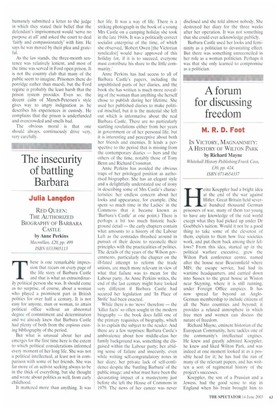The insecurity of battling Barbara
Julia Langdon
RED QUEEN: THE AUTHORIZED BIOGRAPHY OF BARBARA CASTLE by Anne Perkins Macmillan, £20, pp. 499 ISBN 0333905113 There is one remarkable impression that recurs on every page of the life story of Barbara Castle and that is what an extraordinarily political person she was. It should come as no surprise, of course, about a woman who played a prominent part in British politics for over half a century. It is not easy for anyone, man or woman, to attain political office without an abnormal degree of commitment and determination and we already knew that Barbara Castle had plenty of both from the copious existing bibliography of the period.
But what is unusual about her and emerges for the first time here is the extent to which political considerations informed every moment of her long life. She was not a political intellectual, at least not in comparison with some of her friends. She was far more of an activist seeking always to be in the thick of everything, but she thought and wrote about politics as well, from early childhood.
It mattered more than anything. It was her life. It was a way of life. There is a striking photograph in the book of a young Mrs Castle on a camping holiday she took in the late 1940s. It was a politically correct socialist enterprise of the time, of which she observed, 'Robert Owen [the Victorian syndicalist] would have approved of this holiday for, if it is to succeed, everyone must contribute his share to the little community.' Anne Perkins has had access to all of Barbara Castle's papers, including the unpublished parts of her diaries, and the book she has written is much more revealing of the woman than anything she herself chose to publish during her lifetime. She used her published diaries to make political mischief, but it is the material she left out which is informative about the real Barbara Castle. There are no particularly startling revelations either from her years in government or of her personal life, but it is interesting and perceptive about both her friends and enemies. It lends a perspective to the period that is missing from the contemporary diaries — hers and the others of the time, notably those of Tony Benn and Richard Crossman.
Anne Perkins has avoided the obvious traps of her privileged position as authorised biographer. She has an elegant style and a delightfully understated use of irony in describing some of Mrs Castle's characteristics: her endless concern about her looks and appearance, for example. (She spent so much time in the Ladies in the Commons that it became known as 'Barbara's Castle' at one point.) There is perhaps a bit too much historic background detail — the early chapters contain what amounts to a history of the Labour Left as the comrades thrashed around in pursuit of their desire to reconcile their principles with the practicalities of politics. The details of the years of the Wilson governments, particularly the chapter on the ill-fated attempt to reform the trade unions, are much more relevant in view of what that failure was to mean for the Labour party. As Anne Perkins writes, the end of the last century might have looked very different if Barbara Castle had secured her legislation and 'In Place of Strife' had been enacted.
While there is no 'news' therefore — the 'killer facts' so often sought in the modern biography — the book does fulfil one of the primary requisites of biography, which is to explain the subject to the reader. And there are a few surprises: Barbara Castle's ambivalence about how middle-class her family background was, something she disguised within the Labour party; her abiding sense of failure and insecurity, even while writing self-congratulatory notes in her diary; her private lack of self-confidence despite the 'battling Barbara' of the public image; and what must have been the devastating impact of a mastectomy just before she left the House of Commons in L979. The news of her cancer was never disclosed and she told almost nobody. She destroyed her diary for the three weeks after her operation. It was not something that she could ever acknowledge publicly. Barbara Castle used her looks and femininity as a politician to devastating effect. But there was something unreconciled in her role as a woman politician. Perhaps it was that she only learned to compromise as a politician.


































































































 Previous page
Previous page